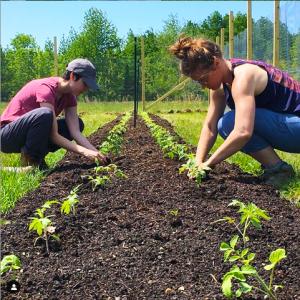Alas, and did my Savior bleed,
and did my Sovereign die?
Would He devote that sacred head
for such a worm as I? Isaac Watts
When I recall the words to some of the hymns we regularly sang in church during my youth, I’m amazed that anyone survived intact psychologically. I am told that in recent hymnbooks the question in the last line has been changed to “for sinners such as I?” but the sentiment remains the same. And it’s not as if Isaac Watts was way out of bounds when he likened himself (and us) to a worm in this text—human beings are compared to worms frequently in the Bible, particularly in the Jewish scriptures. Job talks about worms a lot while sitting on his ash heap (can you blame him?), and the Psalmist calls himself a worm on many occasions.
The worminess of human nature has caught on over the centuries as a cornerstone of some versions of Christianity, particularly some Protestant varieties. John Calvin wrote about “man who is but rottenness and a worm,” regularly, and Martin Luther likened God’s grace to a fresh layer of snow covering a pile of shit, the sort of pile where worms invariably like to hang out. As a youngster who had a particular aversion to legless crawling things like worms and snakes, learning that I am no more than a worm in my natural state was a particularly depressing lesson. When Simone Weil likens an afflicted person, someone whose identity and dignity have been stripped away by forces beyond their control, as a “victim writhing on the ground like a half-crushed worm,” the image is gut-wrenching.
As you might have gathered, I don’t like worms. So why am I writing about them in this essay? Because I am paying attention to the sort of “coincidence” that I used to ignore but have learned over the past decade or so to pay attention to. Last Saturday, as Jeanne and I returned from taking Bovina to a dog park for the first time (it was a success), we were listening to NPR’s “Wait, Wait, Don’t Tell Me” on the drive home. WWDTM is a “must listen” for us each week; this episode was taped before a live audience in Buffalo, NY. The celebrity guest of the day was a famous person for Buffalonians (I Googled that one)—vermiculturist Myles Stubblefield, affectionately known as “The Worm King.”
A vermiculturist is someone who is a worm farmer and uses the worms to convert waste products such as uneaten food, feces, grass clippings, and spoiled fruit and vegetables into healthy, nutrient-rich soil and organic fertilizer. Myles Stubblefield started down the worm farming path when seeking the best ways to deal with the piles of dog poop he was responsible for getting rid of as he worked over several years at “almost every dog kennel and boarding facility in the Buffalo area.”
Eventually Stubblefield landed on composting, which led him to worms. Purchasing worms at anywhere from $65-$80 per pound from Amazon Prime, delivered to his door, Stubblefield got started. He now estimates that there are slightly more than one million worms in his composting factory; they just sold their first one-ton shipment of dog-poop-and-worm-generated compost to one of the many organic farmers in western New York.
The WWDTM crew had great fun with all of this of course—I was just glad that it was a radio rather than a television show. I don’t have any interest in seeing one million worms in one location. But worms weren’t done with me yet. The next morning as I drove a friend to catch a plane at the airport, then on to church, I listened on a podcast to Jeff Chu’s talk from the 2018 inaugural “Evolving Faith” conference. The conference was the brainchild of Rachel Held Evans (about whom I’ve written recently) and Sarah Bessey; Chu, a close friend of Evans, was invited to be one of the speakers. I first learned about Chu because he completed Rachel Held Evans’ final book, Wholehearted Faith, from Evans’ incomplete manuscript and other unpublished notes after her untimely and tragic death at age 37 in 2019. Wholehearted Faith was one of the texts we read and discussed in my “Faith and Doubt” colloquium this semester.
Jeff Chu is Chinese-American, an author and journalist whose memoir, Does Jesus Really Love Me? A Gay Christian’s Pilgrimage in Search of God in America, was published in 2014. Chu is currently studying at Princeton Theological Seminary “because I had to find a less lucrative career than journalism.” He grew up Southern Baptist and is the grandson and nephew of preachers. His talk at “Evolving Faith” was entitled “The Theology of Compost.” Compost on two consecutive days? Something told me I should pay attention.
So what do seminary and composting have to do with each other? Chu tells the story.
When I got to Princeton, I unexpectedly landed at the Farminary, which is 21 acres where we dig in the dirt and introverts don’t have to talk and it still counts as class. You come down this long gravel driveway . . . And to the right is our garden . . .We need compost to enrich the soil and we’re making it. It’s being made on our compost pile, which is, to me, the most beautiful place on the farm. I didn’t know much about compost before. But now I know that it preaches a hundred Sundays of sermons about death becoming new life, about God’s abundance, about how these things that seem useless—moldy fruit, onion skins, eggshells, coffee grounds—these become rich soil.
From his time at the Farminary and learning about composting, Chu has concluded that Christians need “a robust theology of compost,” because the story of compost is “really just the story of God. Turning fear to courage, sorrow to joy, death to life.” The next time someone tells you, or you tell yourself, that you are no better than a worm, remember that “Worms can be magic. Worms can be engines of redemption. Worms devour things of death and poop out life. And God gave their poop that power.” Here are some other elements of a theology of the compost:
- Death and the things of death, our sin, our suffering, the ways we hurt each other, the ways we harm ourselves— These things are never the end of God’s story.
- We are still in the process of becoming, and God has written redemption into the story of creation itself.
- God has empowered us, lowly worms, to turn what is ugly and festering and dying into what is lovely and beautiful and life-giving.
- We can’t do this alone, but we need others, because a single worm can’t do very much but in community they have such tremendous power.
- We who have been told by society that we are worthless can act in the confidence of the knowledge that we are worthy.
- A robust theology of the compost testifies that God urges those of us who have been shamed not to shame, but instead to love. Because in our acts of love, we participate in preparing the soil in which God’s reign of love and justice can take root.
“Would He devote that sacred head for such a worm as I?” A theology of the compost affirms that “God sure as hell would.” Imagine being empowered to transform decaying shit into abundant and fertile life. Once again we are reminded that God’s way of getting into the world is through human beings. For a model of how to do that, look to the worm.













